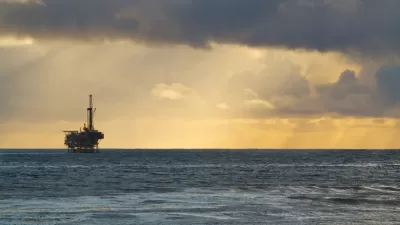Shell Oil's seven-year, $4 billion investment has paid off. Awaiting final Interior Dept. permits, two drilling ships, moored in Seattle, are poised to travel to the Arctic to begin drilling test wells in 150 ft of water off northern Alaska in July.
In this feature article, John M. Broder and Clifford Krauss look at the conditions, including the legacy of the Exxon Valdez disaster in 1989, that led to Shell Oil's successful pursuit of the right to drill in the fragile Arctic waters. Shell took a different political course than its Big Oil brethren as it set about wooing potential adversaries by "pushing for a strong response to climate changes."
Its biggest obstacle proved not to be President Obama, "under pressure from rising gas prices" nor the mainstream environmental organizations who remain opposed to the effort.
"Frances Beinecke, president of the Natural Resources Defense Council and a member of the National Commission on the Deepwater Horizon Oil Spill and Offshore Drilling characterized the exploration as "a reckless gamble we cannot afford."
The 5,000 Inupiat Eskimos who see the drilling as a threat to their whale-based culture, and their leader, North Slope Borough Mayor Edward S. Itta whose "gravitas grew from his acclaim as one of the area's finest whaling captains", proved to be the greatest obstacle. As Broder writes in his Green blog, these Eskimos are the ones most likely to suffer should there be an oil spill.
"Shell company executives say (the Arctic) could eventually yield a million barrels a day of crude - or more than 10 percent of current domestic output." [U.S. Crude oil plus petroleum products of 8.5 mb/day + natural gas liquids of 2 mb/day.]
As possibly an omen of the difficulties in drilling in the Arctic that await Shell, "the heaviest polar ice in more than a decade is clinging to the northern coast of Alaska could postpone the commencement of offshore oil drilling until the beginning of August", reports the LA Times.
FULL STORY: New and Frozen Frontier Awaits Offshore Oil Drilling

Maui's Vacation Rental Debate Turns Ugly
Verbal attacks, misinformation campaigns and fistfights plague a high-stakes debate to convert thousands of vacation rentals into long-term housing.

Planetizen Federal Action Tracker
A weekly monitor of how Trump’s orders and actions are impacting planners and planning in America.

In Urban Planning, AI Prompting Could be the New Design Thinking
Creativity has long been key to great urban design. What if we see AI as our new creative partner?

King County Supportive Housing Program Offers Hope for Unhoused Residents
The county is taking a ‘Housing First’ approach that prioritizes getting people into housing, then offering wraparound supportive services.

Researchers Use AI to Get Clearer Picture of US Housing
Analysts are using artificial intelligence to supercharge their research by allowing them to comb through data faster. Though these AI tools can be error prone, they save time and housing researchers are optimistic about the future.

Making Shared Micromobility More Inclusive
Cities and shared mobility system operators can do more to include people with disabilities in planning and operations, per a new report.
Urban Design for Planners 1: Software Tools
This six-course series explores essential urban design concepts using open source software and equips planners with the tools they need to participate fully in the urban design process.
Planning for Universal Design
Learn the tools for implementing Universal Design in planning regulations.
planning NEXT
Appalachian Highlands Housing Partners
Mpact (founded as Rail~Volution)
City of Camden Redevelopment Agency
City of Astoria
City of Portland
City of Laramie




























